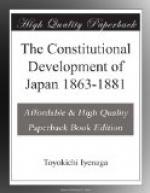Thus was the renowned commander kept away for awhile. He went, however, of his own accord. Perry was an astute diplomatist. He knew that time was needed for the impressions which he and his magnificent fleet had made upon the country to produce their natural effect.
The news of Perry’s visit and demands spread far and wide with remarkable rapidity. The government and the people were deeply stirred. Soon the song of the “red-bearded barbarians” and of the black ships was in everybody’s mouth. The question “What shall Japan do when the barbarians come next spring?” became the absorbing theme of the day.
There was now but one of two policies which Japan could pursue, either to shut up the country or to admit the foreigners’ demand. There was no middle course left. The American envoy would no longer listen to the dilatory policy with which the Japanese had just bought a few months’ respite from anxiety.
The majority of the ruling class, the Samurai, were in favor of the exclusion policy. So was the court of Kioto. But the views of the court of Yedo were different. The court of Yedo had many men of intelligence, common sense and experience—men who had seen the American envoy and his squadron, equipped with all the contrivances for killing men and devastating the country. These men knew too well that resistance to the foreigners was futile and perilous.
Thus was the country early divided into two clearly defined parties, the Jo-i[4] party and the Kai-Koku party.
Meanwhile, the autumn and winter of 1853 passed. The spring of 1854 soon came, and with it the intractable “barbarians.” Let us hear the author of Genje Yume Monogatari relate the return of Perry and the great discussion that ensued at the court of Yedo:
“Early in 1854 Commodore Perry returned, and the question of acceding to his demands was again hotly debated. The old prince of Mito was opposed to it, and contended that the admission of foreigners into Japan would ruin it. ‘At first,’ said he, ’they will give us philosophical instruments, machinery and other curiosities; will take ignorant people in, and, trade being their chief object, they will manage bit by bit to impoverish the country, after which they will treat us just as they like—perhaps behave with the greatest rudeness and insult us, and end by swallowing up Japan. If we do not drive them away now we shall never have another opportunity. If we now resort to a dilatory method of proceeding we shall regret it afterwards when it will be of no use.’




